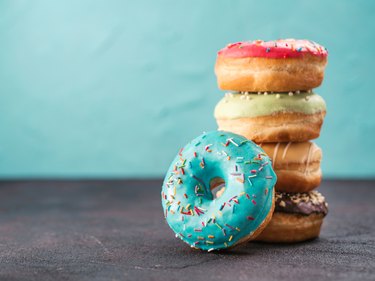
Cramps, bloating and cravings visit most women once a month. If you're one of these women, you've done what you can to avoid the pain. But do you know which foods to avoid during your period? A heating pad doesn't have to be your only weapon.
Avoid These Menstrual Symptoms
Video of the Day
UpToDate noted some of the common symptoms of menstruation in a January 2018 article. While everyone's experience differs, most women bloat during their period. Cramping is, of course, the epitome of menstrual symptoms. You may also experience anxiety, depression and mood swings.
Video of the Day
Adding to the irritability you may feel, a North Bristol NHS study from August 2017 found that periods destabilize blood sugar. And if you've ever been "hangry," you know just how problematic destabilized blood sugar can be.
You're most likely already familiar with these symptoms. But you can minimize them. You just need to know which foods to avoid during a period.
Keep Off the Caffeine
Who doesn't love a cup of coffee in the morning? And when you're already feeling icky from your period, you need the pickup. Unfortunately, the caffeine in your beverage of choice may not be your greatest ally during menstruation.
As noted in the UpToDate post, your period can bring on depression and anxiety. Not a great addition to the bloating and cramps you're already experiencing. That's why you may want to add caffeine to your list of food to avoid during menstruation.
An article in the March 2016 Korean Journal of Family Medicine found that caffeine increases depression. Adding to the issue, an October 2015 article in Journal of Psychopharmacology found that caffeine increases anxiety, which means you may want to find alternatives to your morning cup.
Watch Out: Blood-Sugar Spikes
As noted in the NHS study, your period destabilizes your blood sugar. So you'll want to stay away from foods that cause spikes and crashes. A leading culprit, according to a November 2016 article in the National Institute of Diabetes and Digestive and Kidney Disease, is sugar.
While small doses of sugar can give you the boost your blood sugar needs, too much leads to a crash. Since the highs and lows of blood sugar can impact several things, keeping it balanced can help you feel more stabilized during your period.
Read more: 15 Reasons to Kick Sugar
Bad Foods for Your Hormones
Your period is a hormonal balancing act you shouldn't disrupt without medical assistance. That's why you need to watch out for foods that will throw off your hormones.
An HHS Public Access September 2014 study found that alcohol disrupts hormones. A discovery that is disappointing for all women who enjoy wine during their period. Slightly less disappointing was a Current Opinion in Clinical Nutrition and Metabolic Care's November 2016 article's findings on soy's hormonal impact.
The good news for the soy and wine lovers alike is neither are a problem unless consumed in excess.
Foods to Avoid During Periods
You probably didn't need to be told that your period's a terrible time to make your bloating worse. But you may not be paying attention to the foods that can increase bloating.
An article in the February 2017 Gastroenterology and Hepatology said that sugar and excessive glucose can cause bloating. So you're going to want to stay off the sugary foods during your next menstrual cycle. And while baked goods might be what you're craving, glucose is a good food to avoid during menstrual cramps. Too much will leave you more uncomfortable than you started out.
While not everyone has dairy sensitivities, it can also be a bloating irritant.
- UpToDate: "Epidemiology and Pathogenesis of Premenstrual Syndrome and Premenstrual Dysphoric Disorder"
- Korean Journal of Family Medicine: "The Relationship of Caffeine Intake with Depression, Anxiety, Stress, and Sleep in Korean Adolescents"
- Journal of Psychopharmacology: "Caffeine Consumption and Self-Assessed Stress, Anxiety, and Depression in Secondary School Children"
- Gastroenterology and Hepatology: "Fodmaps: Food Composition, Defining Cutoff Values and International Application"
- Current Opinion in Clinical Nutrition and Metabolic Care: "Risks and Benefits of Phytoestrogens: Where Are We Now?"
- HHS Public Access: "Effects of Alcohol on the Endocrine System"
- North Bristol NHS: "Diabetes and Your Periods"
- National Institute of Diabetes and Digestive and Kidney Disease: "Diabetes Diet, Eating, & Physical Activity"